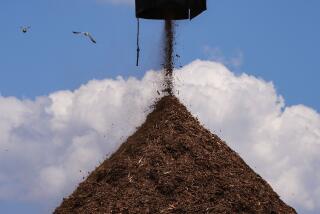Pencil City, USA can proudly say, ‘We’re No. 2!’ : Despite computers, foreign competitors and rising wood prices, this Tennessee town’s industry hasn’t dulled.
- Share via
SHELBYVILLE, Tenn. — Kathleen Wells sits in front of the cedar slats, gently laying a graphite core into the scored groove. She wipes her smudged fingers on an apron, then reaches for another core. Wells, 75, is assembling carpenter pencils at the Musgrave Pencil Co.
She has been working in pencils for 58 years, and astonishingly enough, she could probably do it for another 58. If her fingers could hold up.
Despite the onrush of computers and the decline of handwritten letters, despite the rising cost of prime wood and the intensity of foreign competition, American pencil making is still a pretty sharp business. And most of it is done right here in the hills of central Tennessee, as it has been for decades.
Total sales of all types of pencils, from the Yellow No. 2s to eyebrow markers, reached 2.8 billion last year, up from 1.8 billion in 1983. Pencil industry revenue was $161.8 million in 1993, the last year for which figures are available, up from only $38 million in 1973.
The pencil folks can rely on some pretty steady customers. The New York Stock Exchange buys 1 million a year. The U.S. government buys 45 million. All that writing and erasing sustains Shelbyville, which calls itself Pencil City, USA. Seven plants here and in nearby Lewisburg turn out millions of pencils a day.
The Sanford Corp. is constructing a $13-million state-of-the-art warehouse and distribution center here for its pencils and other writing instruments. The area’s seven pencil factories are supported by satellite industries that produce paint, erasers and graphite cores (commonly called pencil “lead”), as well as imprinters and packagers. “We’ve got a real diverse manufacturing base, which is good for any town,” says Henry Hulan, corporate secretary at Musgrave, the area’s oldest pencil manufacturer.
For Wells and most others who live here, making pencils is the only work they have known. Older employees work side-by-side on the assembly line with those generations younger. They supervise machinery that glues, cuts and paints. They lift handfuls of pencils from bins, check for blemishes and count them into gross lots. At the smaller factories like Musgrave, little has changed in decades.
Musgrave makes between 250,000 and 500,000 pencils a day. They come in 80 colors and over 300 designs. “We do everything from glow and glitz to motivational to holiday to inspirational,” Hulan said recently as he walked along an assembly line. “On some, we put erasers on both ends, then cut the pencil in half making two short stubby ones for golfers.”
Hulan is a third-generation employee at Musgrave. His grandfather, Jim Musgrave, moved to this area in search of Tennessee red cedar, the material of choice for pencils. Musgrave wasn’t interested in cutting down trees. What he needed for pencil slats was the cut and dried wood that farmers had used to build barns and fences.
“Grandfather would buy rolls of steel fencing and trade that for cedar fencing,” Hulan said. “He’d go out with a fencing crew and actually put fences up for the ones taken down. That’s how he got a lot of his dried cedar to start with.”
In 1923, Musgrave traveled to Germany and brought back pencil-making machinery. Within a year his company was producing Shelbyville’s first red cedar pencils.
Other factories opened in the area and before long, the red cedar was gone. So, too, was the truly local nature of the industry.
Now it is California incense cedar, grown in sustained-yield forests principally on the western slopes of the Sierra Nevadas, that is the backbone on which the Tennessee pencil industry thrives.
Federal regulations and environmental concerns are raising the cost of the wood. And pencils from other countries, especially China and Indonesia, are competing with the domestic variety. In many cases, the foreign pencils are made from jelutong, a rain-forest wood.
J.R. Moon Pencil Co. in Lewisburg, for instance, uses only California incense cedar for the 750,000 pencils it produces daily.
“The fact that Chinese and Taiwanese manufacturers are using jelutong wood is detrimental to us all,” said Jackie Crowell, Moon’s sales and marketing manager. “Aside from the economic factors involved, I’m attached to breathing. I’d like to see the rain-forests hang around.”
That has resulted in one modern note to the age-old pencil business. So that buyers know what their pencils are made of, many companies are adding statements like “does not contain rain-forest wood” to their packages.
More to Read
Inside the business of entertainment
The Wide Shot brings you news, analysis and insights on everything from streaming wars to production — and what it all means for the future.
You may occasionally receive promotional content from the Los Angeles Times.










